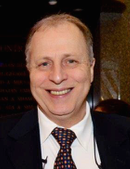Gregorio Chazenbalk,
Research Associate, Dept of Obstetrics and Gynecology,
University of California-Los Angeles
As a basic scientist with more than 30 years of experience in molecular and cellular biology, Dr Chazenbalk has demonstrated substantial leadership experience in directing successful and productive research. His efforts has produced a body of work in the fields of molecular endocrinology, immunology, and cell biology resulting in more than 100 publications in prestigious journals such as Science, Proceedings of the National Academy of Sciences of the United States of America, Journal of Clinical Investigation, Journal of Biological Chemistry, Journal Clinical Endocrinology and Metabolism, and others. Early in his career, Dr Chazenbalk was awarded multiple scholarships from the Argentine Foundation of Endocrinology, the National Research Council of Argentina and the Argentine Endocrinology Foundation. After working for more than 20 years in thyroid research at the VA Hospital of San Francisco, the University of California, San Francisco (UCSF) and in the Thyroid Autoimmunity Disease Unit at Cedars Sinai Medical Center, Los Angeles, Dr Chazenbalk has been recognized internationally as an expert in thyroid regulation and autoimmunity. During that period, Dr Chazenbalk cloned the entire repertoire of human thyroid peroxidase autoantibodies which play a critical role in Hashimoto’s thyroiditis and conducted critical studies on the structure-function of the human thyrotropin receptor (TSHR), primary antigen of Graves’ disease. In addition, Dr Chazenbalk has pioneered discoveries on the cleavage site of the human thyrotropin receptor which has wide-ranging implications for the understanding of the pathophysiology of Graves’ Disease at both the molecular and cellular levels. His work in this field led him to successfully engineer the human thyrotropin receptor A subunit. The availability of this protein ignited further studies illuminating its crucial role in the initiation and/or amplification of the autoimmune response in Graves disease. Dr Chazenbalk was honored in 2001 to receive the prestigious award “Best Thyroid Scientist” from the Latin American Thyroid Association for my work in this field. In 2006, Dr Chazenbalk joined the Department of Obstetrics and Gynecology at Cedars-Sinai Medical Center as a scientist and as a member of the faculty of the Departments of Medicine and Obstetrics and Gynecology at UCLA. Since that time, Dr Chazenbalk has examined the role of inflammation in insulin resistance in adipose tissue of patients with Polycystic Ovary Syndrome (PCOS). Dr Chazenbalk was the first scientist to demonstrate that the accumulation of preadipocytes can be accelerated in vitro via cross-talk between adipocytes and resident macrophages and adipose stem cells, which can generate new adipocytes. This phenomenon may lead to the development of novel methods of tissue regeneration and reconstructive medicine, as well as in 2013, Dr Chazenbalk discovered a novel population of stem cells with pluripotent characteristics isolated from human adipose tissue. Despite their pluripotency, these stem cells do not produce teratomas in vivo, offering new avenues to treat many disorders (stroke, heart attack, diabetes, neurodegenerative and immune disorders, etc). This discovery has made a significant impact in the fields of regenerative medicine and cell therapy and has been recognized in the national and international media. It has also led to a patent application entitled “Pluripotent Human Adipose Adult Stem Cells: Isolation, Characterization and Clinical Implications.” Dr Chazenbalk received in 2014 an award from the Japanese Society of Science for his work in this field and to be invited to serve as the Editor of a scientific book entitled, “Muse Cells: A New Era of Pluripotent Stem Cells”, which is scheduled for publication by Springer in September 2015.
|

|

 Add to Calendar ▼2014-04-22 17:00:002014-04-22 18:00:00Europe/LondonMuse Cells Derived from Adipose Tissue: A New Perspective on the Clinical Potential of Adult Pluripotent Stem CellsClinical Translation of Stem Cells 2014 in Palm Springs, California, USAPalm Springs, California, USASELECTBIOenquiries@selectbiosciences.com
Add to Calendar ▼2014-04-22 17:00:002014-04-22 18:00:00Europe/LondonMuse Cells Derived from Adipose Tissue: A New Perspective on the Clinical Potential of Adult Pluripotent Stem CellsClinical Translation of Stem Cells 2014 in Palm Springs, California, USAPalm Springs, California, USASELECTBIOenquiries@selectbiosciences.com Add to Calendar ▼2014-04-21 00:00:002014-04-22 00:00:00Europe/LondonClinical Translation of Stem Cells 2014Clinical Translation of Stem Cells 2014 in Palm Springs, California, USAPalm Springs, California, USASELECTBIOenquiries@selectbiosciences.com
Add to Calendar ▼2014-04-21 00:00:002014-04-22 00:00:00Europe/LondonClinical Translation of Stem Cells 2014Clinical Translation of Stem Cells 2014 in Palm Springs, California, USAPalm Springs, California, USASELECTBIOenquiries@selectbiosciences.com